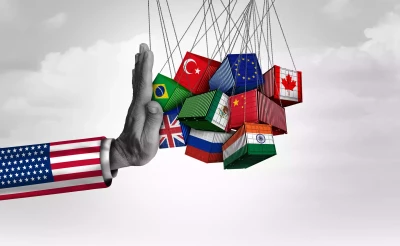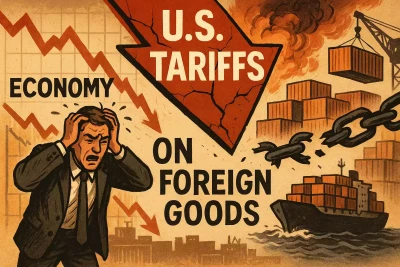Tariff Turmoil: How New Trade Policies Could Shock The Supply Chain
April 29, 2025
 Tariffs have always been a hot-button topic in the world of economics, but their real-world impacts extend far beyond political debate. They ripple through the economy, affecting jobs, consumer prices, and business investment. Understanding these impacts is critical for anyone navigating today’s market, especially in industries like transportation and logistics.
Tariffs have always been a hot-button topic in the world of economics, but their real-world impacts extend far beyond political debate. They ripple through the economy, affecting jobs, consumer prices, and business investment. Understanding these impacts is critical for anyone navigating today’s market, especially in industries like transportation and logistics.
Consumers account for the vast majority of all economic activity in the US, meaning that any disruption in purchasing behavior can have widespread effects. Tariffs raise the price of imported goods, forcing companies to either absorb higher costs or pass them on to consumers. In turn, higher prices can lead to lower demand, reduced business revenues, and ultimately job cuts.
“Consumers are 70% of all economic activity,” says Dan North, Senior Economist at Allianz Trade North America. “We see potential for job loss, and we also see potential for inflation. That’s the big problem with tariffs: job loss and inflation.”
Looking at historical data, inflation in the U.S. averaged around 2.2% from the early 1980s through today, a relatively low rate that coincided with the rise of globalization. Access to inexpensive goods from countries like China and Mexico has allowed American consumers to enjoy more affordable products, helping to keep inflation in check. Disrupting this dynamic through aggressive tariffs risks undoing decades of economic stability.
Will tariffs spell chaos for the global economy and supply chain? Gain insights into emerging economic trends with the latest episode of the Stay In Your Lane Podcast.
Recent surveys show that while some Americans support the idea of “buying American,” the overwhelming concern for most consumers is affordability. Many prioritize low monthly expenses over where a product is made. Considering that nearly half of all apparel sold in the U.S. is made in China, and up to 70% of products sold at major retailers like Walmart originate there, even a modest tariff increase could dramatically impact consumer costs.
Even the threat of tariffs introduces uncertainty into the market. Surveys of supply chain managers reveal growing caution among businesses, with many customers pausing new orders and delaying investments. Companies struggle to forecast costs and revenues, leading to a “wait and see” mentality that slows economic momentum.
“If you’re a business that’s going to buy materials to sell, you might raise the price of that good even before you buy the material because you think it’s going to be higher in price,” North explains.
Consumer sentiment reflects similar concerns. The University of Michigan’s Consumer Sentiment Index recently dropped to its second-lowest level in 75 years. Consumers expect worsening financial conditions and higher inflation in the coming year — sentiments that often become self-fulfilling as people demand higher wages and businesses preemptively raise prices.
 Consumer income growth is also slowing, and spending has become more volatile. These trends suggest that inflationary pressures and economic uncertainty are already reshaping consumer behavior, with potential long-term consequences for industries reliant on strong consumer demand.
Consumer income growth is also slowing, and spending has become more volatile. These trends suggest that inflationary pressures and economic uncertainty are already reshaping consumer behavior, with potential long-term consequences for industries reliant on strong consumer demand.
Businesses in sectors like transportation, logistics, retail, and manufacturing need to stay agile in this uncertain environment. Understanding the downstream effects of tariffs — from rising costs to shifting consumer behavior — is essential for making smart investment and operational decisions. It is important to diversify supply chains to mitigate the risks associated with specific countries and monitor consumer trends closely to adapt quickly to changing spending habits. Supply chain professionals should also seek to strengthen relationships with North American partners to capitalize on more stable and reliable trade routes and prepare for inflation by carefully managing pricing strategies and costs.
The next few years could bring more turbulence as trade policies evolve. Businesses that stay informed and adaptable will be best positioned to weather the storm and find opportunities amid the disruption.
In an unpredictable trade environment, having a reliable logistics partner is more critical than ever. Triple T Transport helps businesses navigate supply chain challenges with flexible, efficient 3PL solutions tailored to their evolving needs. Whether you’re facing rising costs, sourcing shifts, or tight delivery windows, Triple T’s expertise ensures your goods keep moving—and your business stays resilient.














